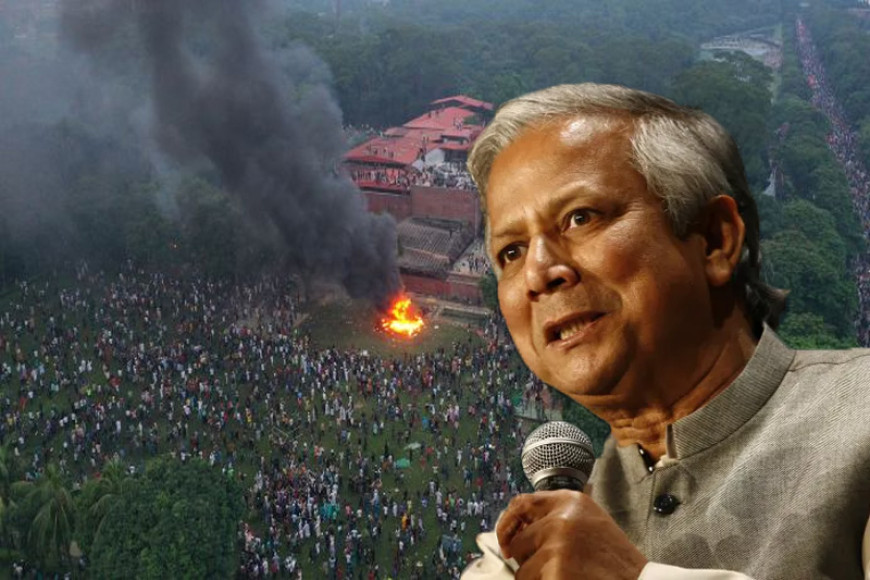“The recent upheaval in Bangladesh underscores the fragile nature of political stability in the region. The interplay of domestic discontent and foreign interference highlights the challenges faced by nations striving for democracy and economic growth." — Dr. Arif Ahmed, Political Scientist and Expert on South Asian Politics”
Dhaka's New Interim Leader
In a dramatic turn of events, Bangladeshi President Mohammed Shahabuddin acceded to the demands of student protesters, dissolving parliament and releasing opposition leader Begum Khaleda Zia from house arrest. This followed Prime Minister Sheikh Hasina's resignation and subsequent flight to India, prompted by mass protests against the country's controversial job quota system. As Bangladesh grapples with its political crisis, Nobel laureate Muhammad Yunus has been appointed to lead an interim government until new elections can be held.
Yunus, an 84-year-old Nobel Peace Prize winner renowned for pioneering microlending through his Grameen Bank, has accepted the leadership role. His selection comes in response to demands from student protesters who view him as a figure of integrity capable of guiding the nation through its current upheaval. Yunus has described Hasina's departure as Bangladesh's "second liberation day," reflecting widespread accusations that Hasina manipulated the quota system to favor allies of her political party, the Awami League.
Formation of a New Government
Following Hasina's departure, Bangladesh's army chief is set to meet with student protest leaders to form a new government. The Students Against Discrimination movement has endorsed Muhammad Yunus as the head of the interim government. Nahid Islam, a key movement coordinator, stated, "We have decided that the interim government would be formed with internationally renowned Nobel Laureate Dr. Muhammad Yunus, who has wide acceptability, as the chief adviser."
Economic and Political Impact of Hasina's Departure
Hasina's critics have long accused her of authoritarianism, including attempts to establish a one-party state by jailing political opponents like Zia, leader of the Bangladesh Nationalist Party. The ongoing protests underscore deep-seated frustrations with economic policies and governance, which have now culminated in a significant political transition.
Hasina's departure to India raises further geopolitical questions. Her stay could strain relations with Indian Prime Minister Narendra Modi, who has often criticized undocumented Bangladeshi immigrants in India. Alternatively, Hasina's relocation to the UK might face backlash from Bangladeshi dissidents exiled there during her 15-year rule.
Foreign Interference: The Role of Pakistan and China
According to foriegn media, Intelligence reports have unveiled significant foreign interference in the recent protests, with Pakistan's Inter-Services Intelligence (ISI) and its Chinese backers identified as key players. The ISI is accused of financing Jamaat-e-Islami Bangladesh's student wing, Islami Chhatra Shibir (ICS), to destabilize Hasina's government. Evidence suggests that ICS members received training in Afghanistan and Pakistan, aiming to establish a Taliban-style regime in Bangladesh.
According to foriegn media, China's involvement appears motivated by strategic interests, preferring a Pakistani-inclined government in Dhaka. This aligns with Beijing's broader geopolitical strategy, as a government in Bangladesh allied with Pakistan could serve China's regional ambitions more effectively than Hasina's balanced approach towards India and China.
Intelligence Revelations and Strategic Implications
According to times of India, An intelligence officer revealed, "The ISI-backed Jamaat-e-Islami received substantial funding earlier this year, much of which is believed to have originated from Chinese entities operating in Pakistan. The ultimate objective is to establish a Taliban-type government in Bangladesh."
The alignment of ICS with ISI and other jihadist groups underscores the extensive planning behind these destabilization efforts. China's Ministry of State Security has also been active in spreading propaganda, further complicating the geopolitical landscape.
Conclusion: Global Implications of Bangladesh's Political Crisis
The unfolding crisis in Bangladesh has far-reaching implications for global trade, economic conditions, and international stability. The involvement of foreign powers like Pakistan and China adds a layer of complexity, influencing regional dynamics and strategic interests.
As Bangladesh navigates this transitional period, the global community will closely watch how these developments affect trade routes, economic growth, and geopolitical alignments. The new interim government, led by Muhammad Yunus, faces the formidable task of restoring stability and guiding the nation towards a more democratic future.
References
1. Foreign Policy Analysis
2. Times of India Report on Foreign Involvement
3. Intelligence Insights
4. Economic and Political Analysis
5. Geopolitical Context
6. BBC News on Bangladesh Political Crisis
7. The Guardian on Hasina's Resignation
8. Reuters Report on Foreign Interference



